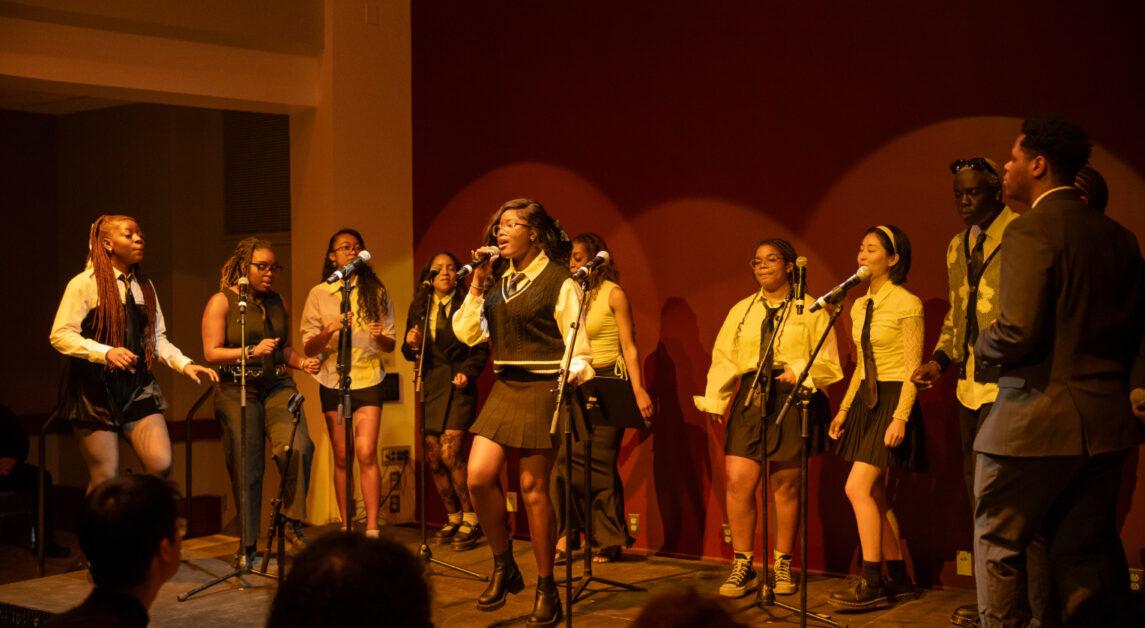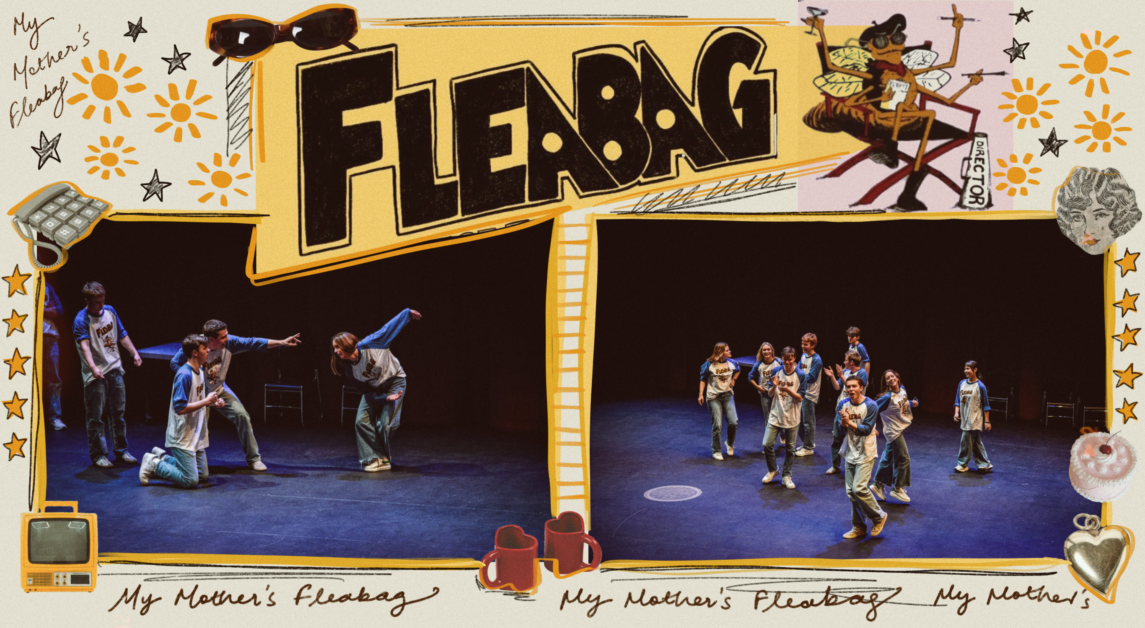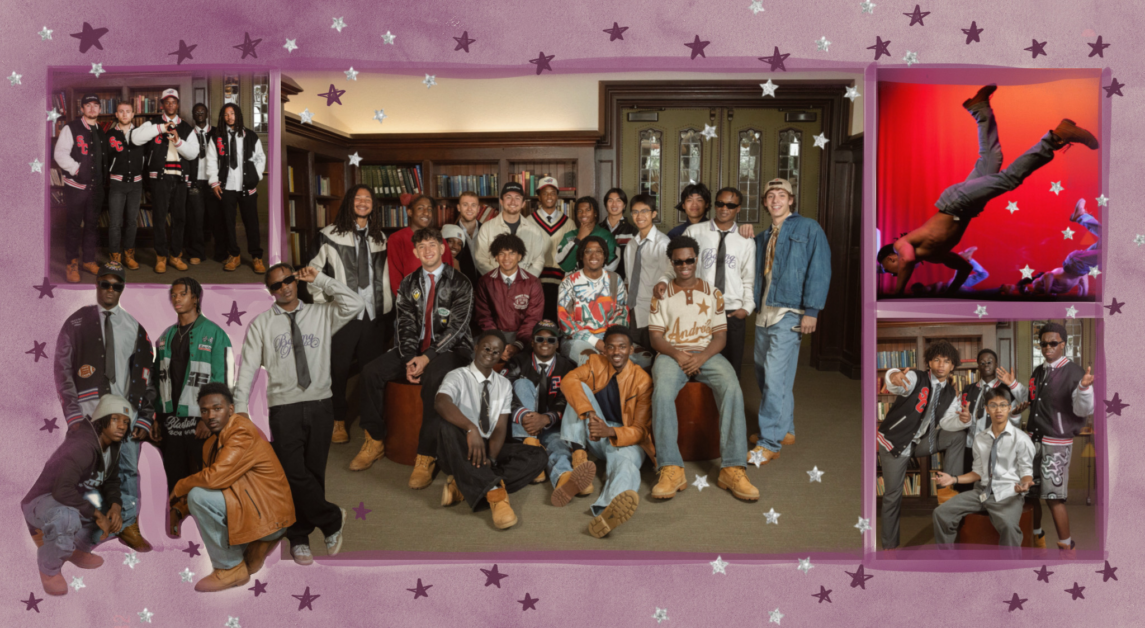After a semester of experimental Zoom plays and cinematic adaptations, the four-person cast of Proof will take one step closer to traditional in-house theatre by returning to the Robsham Theater to perform a live broadcast of the production streamed to virtual audience members.
“If you ever saw like Hamilton on Disney+, it has the energy of Hamilton on Disney+, where you’re consciously aware you’re watching a musical or a [staged version of a] play,” Proof director Jacob Kelleher, MCAS ’21, said. “So that’s how I’m aiming for it to be viewed … people knowing, ‘oh, this is close to how it’d be if I were there.’”
To simulate the theatre experience, Proof, written by American playwright David Auburn, will be livestreamed from three video cameras positioned from the perspective of the empty audience seats. In front of a set fashioned into a house porch, the cast will perform the play on stage while adorned in costumes, clear plastic masks, and gloves.
Kelleher, who’s first attempt at directing for The Understudy by Theresa Rebeck was canceled last spring, originally imagined conducting the play under different circumstances.
The Proof director’s outline, one of two student proposals chosen by the Boston College Theatre Department, was selected last February, weeks before the COVID-19 pandemic transformed the theatre industry—bringing the curtain down on BC’s remaining productions and shuttering theaters across the nation. The pandemic eventually prompted theatre graduate programs to delay their admissions and motivated BC’s theatre department to get creative with performances to ensure that the show would go on.
Although BC’s fall productions, including Shakespeare’s Twelfth Night and Lynn Nottage’s Sweat, were conducted as a movie and performed live with cast members isolated in their own Zoom squares, Proof’s small cast and simple set design ensure that the play can be performed live and on stage, sparing for a few adjustments to the production, Kelleher said.
“The play ended up being such a blessing in and of itself because so many shows that were chosen by the department were really big and really complex in a number of ways, and they simply aren’t feasible to do either over Zoom or under Covid restrictions,” Kelleher said. “So some people had to pick new shows or really do strange adaptations of shows to make things work.”
Any trace of physical contact—including kissing scenes and the exchange of props—have been omitted or carefully rewritten in the script. But social distancing implies discomfort between characters, Kelleher said, challenging him to find alternative stage directions to convey affection between the characters. Kelleher said making these adjustments requires finding ways to preserve the artistic integrity of the piece while keeping his cast safe.
“There’s all these intimate close relationships in the play that I’m trying to demonstrate without ever getting within six feet,” Kelleher said. “So that’s been really challenging, because there’s no way to fix that, like I can’t just make them closer, and I can’t erase the perception of what distance says about a relationship.”
And the play depicts several relationships among its cast members. A romance arises between Catherine, the lead role played by Olivia Sheridan, MCAS ’22, and Hal, played by Grant Whitney, MCAS ’22. Catherine grapples with her relationship with her father Robert, played by William Dooley, MCAS ’22. There are shared moments between Catherine and her sister Claire, played by Emma Thompson, MCAS ’23.
These intimate moments between characters, though modified, are ultimately what propel the play’s plot forward.
Proof follows Catherine as she copes with the death of her father, a brilliant math professor who struggled with his mental health. The play tackles mental illness, family dynamics, grief, and sexism, as Catherine is met with doubt and criticism after she claims to have solved an impossible mathematical proof found in one of her father’s notebooks.
Tasked with portraying Catherine, Sheridan balances Catherine’s struggles as the character battles her own bouts with mental illness and attempts to prove her mathematical prowess—all the while fearing she’s becoming more and more like her father.
“I’m representing a character with this creative genius but also this mental illness, and that’s a big responsibility to me,” Sheridan said. “It’s been pretty emotional to embody her.”
Sheridan said this role converges two of her passions: theatre performance and mental wellness. When the cast of Proof performed a read-through of the script together for the first time in November, Sheridan recalled breaking down into tears after realizing the importance of representing Catherine, a trait that Kelleher took note of when casting Sheridan as the lead.
“Liv is such a phenomenal, strong actress, and she really owns that responsibility and bears that weight and brings Catherine to life in a way that makes her the center of the story without distracting from anyone else’s contributions,” Kelleher said.
In addition to the challenges the Proof team faced with modifying the play to abide by COVID-19 regulations, they were also met with a stunted rehearsal schedule. The cast and crew were challenged to orchestrate a play in under four weeks—about half of the time productions are usually allotted, Sheridan said.
They began rehearsals after Thanksgiving Break, but Sean O’Donovan, MCAS ’24, who was originally cast to play Catherine’s love interest, Hal, and Dooley attended rehearsals virtually from home. This left Sheridan and Thompson to juggle their own roles and to act as stand-ins for the other two actors. Once finals rolled around, the cast and crew disbanded, using the winter break to memorize lines and stage blocking for when they would return in late January.
But pulling off a live play performed in person requires all cast and crew to avoid contracting COVID-19.
“Everyone knows there’s really no room for error,” Kelleher said. “So, to some extent, we’re just crossing our fingers.”
Returning to campus after the long winter break meant the Proof team was at risk of bringing the COVID-19 virus back with them—a potential threat that could close the production before opening night. Thompson said she has been diligently following COVID-19 precautions to ensure nobody involved with the play falls ill, leading to the whole cast to be contact traced.
“Things could go awry at any possible time and that is the unfortunate reality of pandemic theatre,” Thompson said. “There’s just no real way around it. … There’s always going to be hiccups. There’s always going to be little things to tweak, but I think we all just came in with that mindset of like this could all change in a heartbeat.”
Two months after the cast initially united for their first script read-through, the cast and crew hit the ground running upon returning to campus after the long winter break. They entered the final stretches of practices on Jan. 25, 10 days before the first live performance.
As they approached opening night, they narrowly avoided a full shut down of the production. Three days before Proof’s first performance, O’Donovan was contact traced and quarantined. Scrambling to find a replacement, the cast and crew shifted gears in the final stretches of rehearsals to prep a last minute understudy.
Whitney, who originally joined the production as a crew member, assumed O’Donovan’s role. With only three days to memorize lines and blocking, as well as to grow into character, Whitney put the Proof production back on course again.
“I know that we all take this very, very seriously when it comes to protecting the show and bubbling ourselves, and it’s to a certain degree out of our control if we’re contact traced and things like that,” Thompson said. “ … We’re doing what we can, and it’s just been a lesson in the fragility of art, but also it’s strong presence and how it will always survive if not thrive.”
Kelleher said he is looking forward to seeing this production through. Although the theatre production has run into a few obstacles, Kelleher said he’s excited to demonstrate how Zoom theatre can be successfully executed. When the curtain draws open on Feb. 4, Proof will have accomplished a blend of virtual and traditional theatre.
“This is really my first time [directing] at this point, which has been scary in some ways,” Kelleher said. “But the other thing that’s been great is that there’s really no expectations anymore for anything. So, whenever I get nervous I’m like, well, at least it’s happening, and frankly, that’s enough.”
Featured Images by Ikram Ali / Heights Editor
















